
|   |

|   |
The story of loss and grief, inscribed on the earth - Anita Vallabh e-mail: anitavallabhofficial@gmail.com February 25, 2025 Akram Khan's 'Gigenis: The Generation of the Earth' was performed at the Joyce Theatre in New York on February 15. The performance draws upon the immense power of the arts to illuminate the unspoken truth of women who, historically in the context of war, have borne the devastating emotional consequences of futile wars fought to plunder, usurp, and serve the insatiable greed and power-lust of a privileged few. "Gigenis" refers to a tribe of giants in ancient Greek mythology who engaged in warfare, while "The Generation of the Earth" alludes to the numerous wars fought throughout history. By narrating the story of a single woman, the performance raises a pertinent question: at what cost is the emotional persecution of women deemed justifiable? 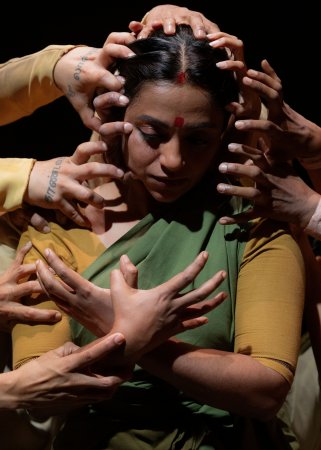 Kapila Venu (Credit: Camilla Greenwell Productions Sarfati) From the moment the curtain rises, accompanied by the percussive sounds emanating from a pitch-dark theater, the ingenious light design and soundscape skillfully draw us into a foreboding narrative. As the dancers watch, a shadow of light marking their presence, Kapila Venu, a virtuoso of Kuttiyattam, steps to the center stage. Her piercing eyes and sharp glances conjure the image of a voracious vulture scanning the battlefield littered with lifeless bodies, violently stabbed and beheaded. It swoops down to tug and pull at the entrails of the dead and holds them aloft, devouring the remains of war. Her eyeballs held in vivartita -wide open with the pupils dilating - her hands raised wide above the shoulders, holding a downward ardhamukula mudra, her tongue protrudes, its tip folded inward, she stands with her feet apart and strikes a terrifying pose that draws us into the depths of her inner turmoil- a mixture of self-loathing and the unspeakable horrors of war. In a somber posture, she, now a forlorn woman, sits hunched over, hastily etching onto the earth the chronicle of generations-long wars, lest the world forget their devastating consequences. As she stands looking faraway lost in thought a soft voice narrates: "In another time, I was a daughter, then a wife, then a mother." As she reminisces, the innocence of her childhood is played by Sirikalyani Adkoli, an Odissi dancer. The grace and fluidity of her movements reflect the purity of childhood innocence. As she is moving, the scene gracefully transitions to her married life. Bharatanātyam dancers Vijna plays the married woman and Renjith Babu, her husband and king. They move in synchrony, around and beside one another. The mellifluous rendition of Muthuswami Dikshitar's Jambupathe maam paahi, fills the air as the dancers, with one hand held across the wrist, weave a gentle motif of a bird in flight juxtaposing the theme of love and freedom against the backdrop of the song lyrics, which expresses a plea for protection and a seeking for the nectar of bliss. The scene concludes with the song Aaj jaane ki zid na karo, with the wife beseeching her husband/king not to go to war, even as he picks his weapon and walks away. Throughout the narration, Kapila Venu's protagonist fades in and fades out as witness to the memories. 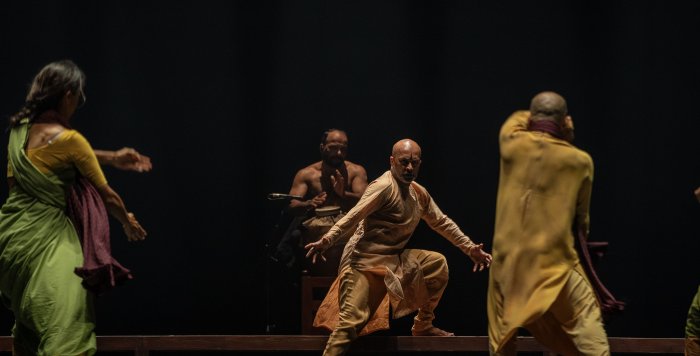 (Credit: Maxime Dos Productions Sarfati) 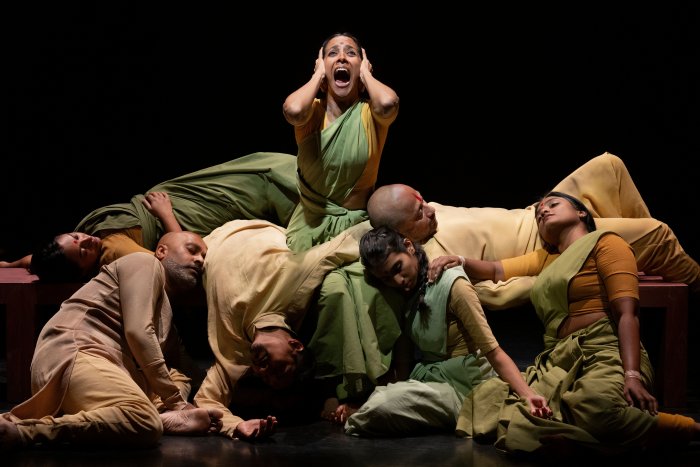 Mythili Prakash (Credit: Camilla Greenwell Productions Sarfati) The next scene paints a picture of a woman across time; Vijna giving birth, Kapila Venu reminiscing the birth of two sons and Mythili Prakash as the mother to two grown sons played by Akram Khan and Mavin Khoo. After the death of the king in war, the trio confront the turmoil of choosing an heir. In a remarkably ingenious scene, Mythili Prakash holds the crown- suggested by her fingers in alapadma towards an oncoming shaft of light. Her rapidly moving fingers illuminated by its golden hue, deftly suggests the sinister allure of greed and power. Akram and Mavin intently gaze upon it. Mavin Khoo as the son chosen by his mother to be king, plays the role with unassuming power. His performance, in movement and stillness was subtle, yet impactful. What soon unfolds is a game of succession with Akram Khan snatching the crown and twirling around in a frenzy of greed. War, as the sound of the percussion and double bass indicate, is imminent. In the last scene, to the mellifluous rendition of Rabindranath Tagore's O Amar desher mati, tomar pare thekai matha, the protagonist Kapila Venu is seen inscribing on the earth. The song expresses an obeisance to the earth on whom rests the universe, and a lament to a life gone by in pointless pursuit. She stands forlorn, her melancholy reaching out to us. The soft refrain narrates: "In another time, I was a daughter, then a wife, then a mother." The lights turn off. 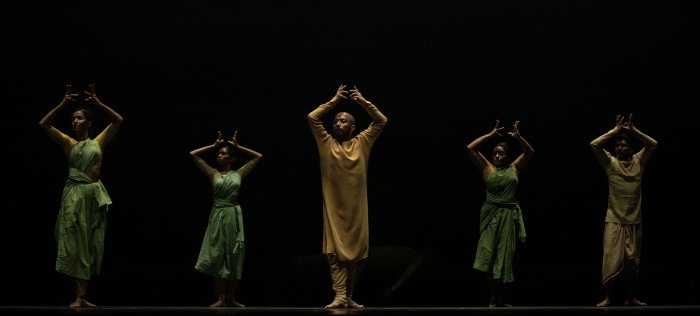 (Credit: Maxime Dos Productions Sarfati) The exceptional artistic expression of each individual artist: Srikalyani Adkoli, Renjith Babu, Mavin Khoo, Mythili Prakash, Vijna Vasudevan and Kapila Venu, is seamlessly integrated into the narrative. As soloists, they perform in their respective classical styles, while as a collective, they execute a cohesive movement. A fusion occurs when the essence of these classical styles is distilled, palpably experienced by the dancer's body and felt by the audience. The musical accompaniment provided by BC Manjunath on the mridangam, Kalamandalam Rajeev on the mizhavu, Hariraam Lam on the violin, Nina Harris on the doublebass, and Sohini Alam, Chitra Poornima Sathish, and Rohith Jayaraman on vocals, was skillfully rendered to mirror the dancers' movements and enhance the emotional intensity of the unfolding narrative. The music orchestration by Jyotsna Prakash is layered, intense, complex, and a synergy of Indian classical with a western sensibility. In moments of heightened tension, when Akram Khan's greed for power engulfs him, his limbs shake with frenzy, and the swelling soundscape mirrors the visceral sense of madness with a frenzied rhythmic drive. In softer moments, as with the duet by Renjith and Vijna, the music is melodious, arousing emotions of love and togetherness. The lighting design by Zeynep Kepekli, and sound by engineer Mark Webber powered the audience experience by providing both an emotional soundscape and a rhythmic foundation for the performance. In accordance with the narrative, the costumes designed by Peggy Housset are in neutral earth tones, their drape simple. Similarly, the makeup is minimalistic. Akram Khan's 'Gigenis: The generation of the earth' is a masterclass that offers invaluable lessons. Through his work he shows us what it means to subsume our individual identity in service to the text and its context, fostering an ongoing narrative. He illumines the extensive roots of our tradition and how being rooted in tradition does not constrain but liberates our narratives in real, meaningful and engaging ways. 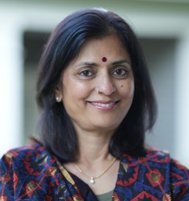 Anita Vallabh Ph.D, is an Affiliate faculty at the University of Hawaii, author, dancer, Yoga instructor and dance critic. She lives in Boston, USA. |